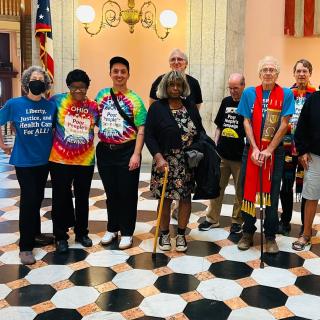Advertisement
The world is producing more clothing than ever -- more than 100 billion pieces a year. As a result, textiles are entering landfills at an unprecedented rate.1
And to make it worse: A lot of clothing is being sent straight to the landfill or burned in an incinerator without ever being worn. The fast fashion model of making more clothes than we can buy wastes precious resources, creates piles and piles of textile waste, and pollutes our air and water.
Environment America is working to slow this endless cycle of overproduction and waste by calling on clothing giant Forever 21 to publicly commit to not trashing or burning its overstock. Add your name.
When you look at a shirt on the rack, what you're really looking at is gallons of water, fossil fuels, pesticides, dyes and fiber -- all needed to make that one clothing item. When we throw that shirt in the trash, we don't just waste the clothing itself, but everything required to make it.
One polyester shirt takes 157 gallons of water and 1.5 cups of crude oil to convert the raw materials into polyester fiber. To make just two shirts produces the same amount of carbon dioxide as driving 43 miles.2
Unfortunately, it doesn't even stop there. Every time a polyester shirt is washed, it releases microplastic fibers that can pollute waterways and eventually make their way into the ocean.3
We can't keep producing clothing at such an unsustainable, harmful rate. Send a message to Forever 21 today, urging it to publicly commit to not trashing or burning its overstock.
A company like Forever 21 that operates hundreds of stores can have a big impact on how much clothing becomes trash.
By committing to not trashing unworn clothing, not only can Forever 21 keep its own merchandise out of landfills, but it can also nudge other companies in the industry to adopt more sustainable practices, too.
Currently, fast fashion retailers are overproducing clothes by 30 to 40% each season -- clothing they know won't be sold. This is not an accident; it's by design.4
We need to show the clothing store that wasteful business models are out of style.
We're calling on Forever 21 to be a leader in the fashion industry and publicly commit to not trashing or burning unsold clothes. Will you join us?
Lisa Frank
Executive Director
1. Celeste Meiffren-Swango and Louis Sokolow, "The high cost of fast fashion," PIRG, November 22, 2023.
2. Celeste Meiffren-Swango and Louis Sokolow, "The high cost of fast fashion," PIRG, November 22, 2023.
3. Celeste Meiffren-Swango and Louis Sokolow, "The high cost of fast fashion," PIRG, November 22, 2023.
4. Aslaug Magnusdottir, "How Fashion Manufacturing Will Change After The Coronavirus," Forbes, May 13, 2020.
Donate today. A cleaner, greener future is within our reach. Your donation today can help us bring the vision we share a little closer to reality.
Environment America, Inc.
1543 Wazee Street, Suite 410, Denver, CO 80202, (303) 801-0581
Federal Advocacy Office: 600 Pennsylvania Ave SE, Suite 400, Washington, DC 20003, (202) 683-1250
Member Questions or Requests: 1-800-401-6511.
Facebook | Twitter | Instagram



